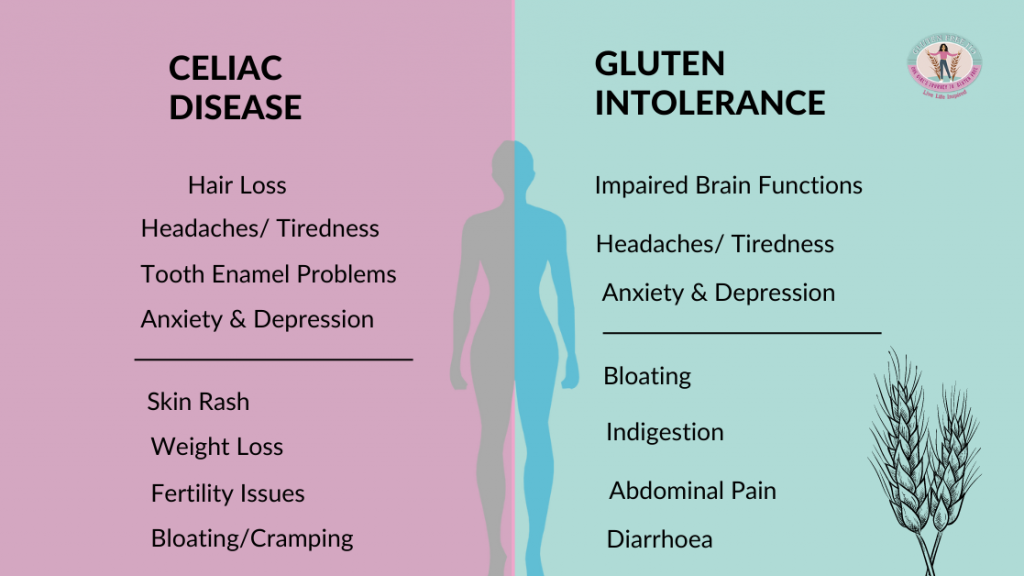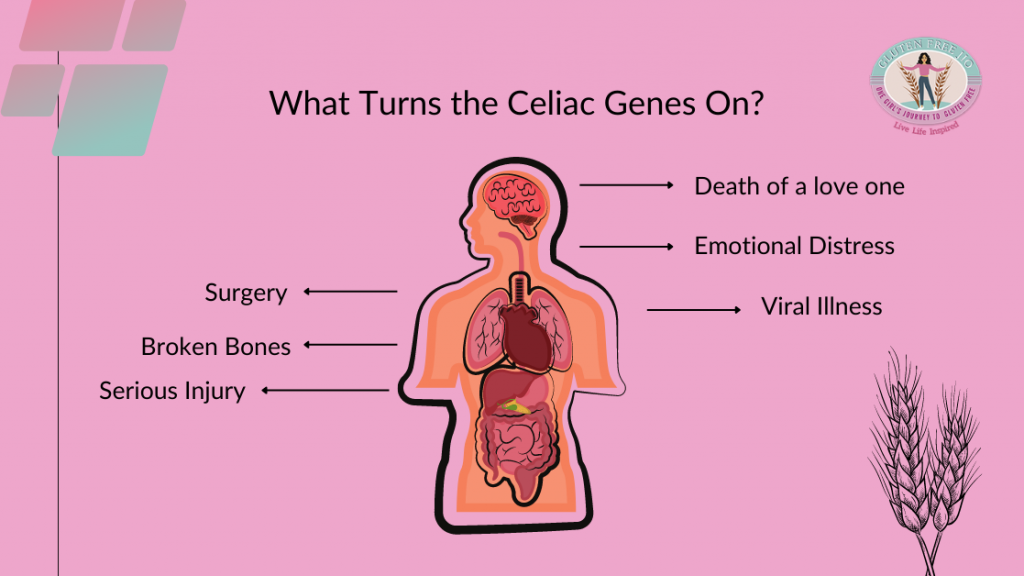60 Frequently Asked Questions About Celiac Disease

Celiac disease is a genetice intolerance to specific proteins which is found in rye, wheat, and grains. When these proteins are consumed by a person having celiac disease, they trigger an autoimmune inflammatory attack in the intestine and cause harm to the villi.
Currently, there is no cure for 1 in 133 people with suspected celiac disease in the United States, and the only known cure is a lifelong gluten-free diet.
1. What is celiac disease?
Celiac disease is a genetice intolerance to specific proteins which is found in rye, wheat, and grains. When these proteins are consumed by a person having celiac disease, they trigger an autoimmune inflammatory attack in the intestine and cause harm to the villi.
2. What are the symptoms of celiac disease?
There are several symptoms of celiac disease including gas, constipation, bowel habits, delayed weight gain, discolored teeth, fatigue,diareha, anemia, joint pain or missed menstrual periods.
Read more: What is celiac disease?
3. What blood tests I should get for celiac?
Your doctor will do blood tests to look for signs of celiac disease. If positive, an endoscopy is required to confirm the diagnosis. It is important not to go on a gluten-free diet until the correct diagnosis is made.
4. Is testing the same for dermatitis herpetiformis?
No, a skin biopsy is used to diagnose the skin condition.
5. What is the difference between celiac disease and gluten intolerance?
Celiac disease is characterized by an autoimmune response to gluten in genetically susceptible individuals, leading to gut damage and malnutrition that can affect every organ system in the body. The only known treatment for celiac disease is a very strict gluten-free diet for life.
Gluten intolerance mostly causes indigestion in people who take gluten without the result autoimmune. It is not known whether there are genetic markers for this intolerance and although the only cure for this condition is also a gluten-free diet, small portions of gluten cannot be tolerated without damaging the small intestine.

6. If I have some of the celiac symptoms, should I try going on a gluten-free diet?
No! When gluten is removed from the diet, the villi heal and the biopsy results are neither accurate nor reliable. People are advised to wait until they are diagnosed with celiac disease before switching to a gluten-free diet.
7. What are common signs of being gluten intolerant?
The most common symptoms if you are intolerant to gluten are:
- Bloating
- Headache
- Fatigue
- Constipation
- Joint Pain
8. I have just been diagnosed with celiac disease, should I get my family tested too?
Yes. Data show that first-degree relatives (parents, siblings, and children) are at higher risk of developing celiac disease, and second-degree relatives (grandparents, grandchildren, aunts, uncles, cousins) to a lesser extent.
9. If I have celiac disease, do I have to follow a gluten-free diet forever?
Yes If you have celiac disease you need to follow a gluten-free diet lifetime because as of now there is no cure for celiac and a small of gluten can harm your body.
10. How can I test myself for gluten intolerance?
Till date, there are no methods to identify whether you are gluten intolerant or not.
However, there are tests available to determine the celiac disease.
11. What is gluten belly?
The intake of gluten damages your intestine which results in a leaky gut and is called a gluten belly.
12. Can gluten cause an itchy scalp?
A person suffering from Celiac disease not only experiences an itchy scalp but also suffers from various rashes and itchiness on the elbow, back, neck, etc the condition is known as dermatitis herpetiformis.
13. What do celiacs have to avoid?
If you are diagnosed with Celiac you can’t eat wheat, barley, semolina, rye, and also the foods containing these grains.
14. What are the common signs of celiac disease?
Some of the common symptoms of celiac disease are constipation, fatigue, gas, bloating vomiting, and stomach ache.
15. How long after eating gluten do celiac symptoms occur?
You may experience nausea within a few hours of gluten intake which is a clear indicator that you might have celiac or are intolerant to gluten.
16. Does celiac gets worse over time?
A timely diagnosis of celiac disease and treatment will not make your condition worse. Once you will maintain a proper gluten-free diet you won’t face any complications.
17. What are the early signs of celiac disease?
Some of the most common signs of celiac disease are diarrhea, fatigue, weight loss, bloating, and gas. Abdominal pain, nausea, vomiting, etc.
18. How long after eating gluten do celiac symptoms occur?
You may experience nausea within a few hours of gluten intake which is a clear indicator that you might have celiac or are intolerant to gluten.
19. Does celiac gets worse over time?
A timely diagnosis of celiac disease and treatment will not make your condition worse. Once you will maintain a proper gluten-free diet you won’t face any complications.
20. Does washing dishes remove gluten?
Gluten cannot be removed unless dishes are washed thoroughly using warm water and soap. However, it is advised that you should use different utensils and separate kitchens to eliminate the risk of cross-contamination.
21. How can I make a celiac kitchen safe?
There are a few steps you need to take care of while making a celiac kitchen safe.
- Purchase utensils in which you can cook gluten-free food.
- Clean the counter frequently.
- Label everything.
- Replace everything that is wood with plastic.
22. What are some easy gluten-free dinner recipes?
You can easily make the following recipes:
- Watermelon And Feta Cheese Salad
- Sabudane Ki Khichdi
- Quinoa Salad
- Quinoa With Roasted Vegetables
If you are looking for some amazing gluten-free dinner recipes check here.
23. What is a gluten-free diet? How do I eat gluten-free?
A gluten-free diet means eliminating the gluten in the diet, it is a type of protein that is found in rye, barley, and wheat. For following a gluten-free diet you need to eliminate all the food s which contains gluten
24. Which health issue can be treated by going gluten-free?
Celiac, gluten intolerance, and gluten insensitivity are some of the major health concerns that are caused due to gluten. Going on a gluten-free diet can prevent you from major health issues caused by these conditions.
25. What is forbidden on a gluten-free diet?
If you are following a gluten-free diet you must avoid wheat, rye, and barley. Apart from this gluten is also present in processed foods.
26. What can cause a false positive celiac blood test?
Yes, people with auto-immune disease can have a false positive test for celiac disease.
27. What to look for on labels to avoid gluten?
If you find a product with the terms – no gluten, free from gluten, or without gluten then the product is complying with the FDA rules and regulations and is gluten-free. But you should also look for the words wheat, barley, rye, or malt to avoid any confusion.
28. What is a gluten-free symbol?
The gluten-free symbol on the food packaging indicated that the manufacturer has followed strict steps to prevent cross-contamination of food or gluten and tested by a third party for gluten
29. Are gluten-free labels accurate?
There are no validated methods to detect the zero or no presence of gluten in food.
30. What is the symbol for gluten-free?
When you see a crossed-grain trademark it signifies that the food is gluten-free.
31. What foods are certified gluten-free?
The following grains, legumes, seeds, and other starchy foods are naturally gluten-free:
- Amaranth
- Arrowroot
- Beans
- Buckwheat groats (also known as kasha)
- Cassava
- Chia
- Corn
- Flax
32. What does the FDA consider gluten-free?
According to FDA, any food containing less than 20ppm (parts per million) is considered gluten-free.
This is the lowest level that can be detected in food using scientific analytical tools.
33. Is it mandatory for manufacturers to test their products before claiming them gluten-free?
No, the manufacturers need not test their ingredients or final product for the presence of gluten. However, if they claim their product to be gluten-free then their product must abide by the rules and regulations under 21 CFR section 101.91 of the FDA.
34. What research is being done on celiac disease?
Researchers from around the world are working to develop new therapies for celiac disease. As a person with celiac disease, you can play an important role in advancing research by participating in clinical trials. So far, however, a gluten-free diet is the only cure.
35. What supplements should celiacs take?
Celiac disease can cause malabsorption problems, which affect your body’s ability to absorb and use nutrients. But whether you have gluten due to celiac disease or not, what you eat can lead to nutritional deficiencies. One reason is that processed gluten-free foods are often not fortified with additional nutrients.
→Vitamins and minerals you may need to take more of include:
→Vitamin B6
→Folic acid
→Vitamin D
→Calcium
→Iron
→Vitamin B12
→Thiamine
→Riboflavin
→Niacin
Taking these vitamin and mineral supplements can help you get enough of these nutrients to maintain good health even if you have gluten sensitivity or celiac disease.
36. What are some complications that can arise from living with celiac without treatment?
If celiac disease is not treated following problems can occur:
Lactose intolerance: If you have celiac disease there are very high chances that you will get prone to lactose intolerance in which your intestine consumes lactose, the natural sugar present in milk.
Lack of vitamins and minerals: When the small intestine is damaged, it cannot absorb vitamins and minerals. People with untreated celiac disease often have low levels of:
→Iron
→Fiber
→Folic acid
→Niacin
→Riboflavin
→Vitamin B12
→Vitamin D
→Calcium
→Magnesium
Other problems related to celiac disease:
- Fertility Problems: Women with undiagnosed celiac might have difficulty in conceiving or get prone to miscarrying.
- Nervous System Problems: Individuals with celiac disease are more likely to develop nervous system issues or a lack of vitamins and minerals can also lead to nervous system problems.
- Complications in children: A child with celiac disease who has not been diagnosed by a doctor may be small and thin.
37. Can stress trigger celiac disease?
Theoretically, stressful life events (such as divorce or even pregnancy) could be associated with celiac disease in two ways: Stress can prompt a person to seek medical help and therefore realize they have celiac disease when reporting the disease beforehand. Your illness report any existing symptoms to their healthcare provider or stress may cause or directly contribute to the condition.
38. How long does it take intestines to heal from celiac?
After being diagnosed with celiac disease and starting a gluten-free diet your symptom will likely improve in a few days however healing of the small intestine can take 3-6 months and if your age is above 60 it can be almost 2 years to get healed properly.
39. What can cause a false positive celiac blood test?
Yes, there is a small risk of getting a false diagnosis for celiac disease for individuals who have an autoimmune disease such as liver disease,thyroiditis, arthritis, diabetes, and heart problems.
40. Is endoscopy necessary for celiac?
Although a blood test is useful in diagnosing celiac disease, it is not perfect. False-negative and false-positive results are possible, so endoscopy is required.
41. Can you still have celiac with a negative biopsy?
Yes, it is also possible just like a negative blood test but a positive bioscopy . If your blood test is positive and biopsy negative this is known as latent celiac disease or potential celiac disease..
42. Are there different levels of celiac?
Yes you can scale your celiac disease the rating is on the scale of and zero rating is taken as normal and if the rating lie between 1-4 it’s abnormal. patients who have a score of 1 or 2 have mild celiac disease and above that is a severe one.-
43. What can I eat before a celiac blood test?
It is recommended to eat a normal diet before being tested for celiac disease because it can compromise the testing results. if you eradicate gluten from your diet before being tested your body will start healing and the test will be false.
44. What are Hla Dq2 and Dq8?
According to experts HLA-DQ2 and DQ8 play a vital role in the development of celiac disease.HLA-DQ2 and DQ8 can show pesticides which is derived from gluten as compared to other kind of HLA

45. What happens if you have celiac and continue to eat gluten?
People who have celiac disease if they consume gluten system produce a reaction in their immune system that causes harm to the small intestine and causes symptoms like bloating, diarrhea, weight loss, and abdominal pain. it is important that you get diagnosed early in life because later in life this condition can create big complications with your health.
46. Does coeliac disease often runs in families?
Yes, you can say that celiac usually runs in family. If your parents or sibling have celiac disease the possibility of getting this disease is also enhanced. This risk increase is about 10% for those who have family history with this disease.
47. What causes celiac disease later in life?
According to experts celiac disease can occur at any age irrespective of gender or race.However, it has been seen that the later the age you identify there are more likely chances that you will get another auto-immune disease . The only way to diagnose celiac disease is through blood tests and endoscopy.
48. What are Celiac disease symptoms in females?
Common symptoms which have been seen in females are the following:
- Diarrhea
- Fatigue
- Weight loss
- Bloating and gas
- Abdominal pain
- Nausea and vomiting
- Constipation
49. How do I know if I’ve got celiac?
Eating foods that contain gluten can cause a number of intestinal problems, such as diarrhea, stomach ache, bloating and farting, and some other intestinal issues.
50. How can I test myself for gluten intolerance?
Home testing can help a person check for celiac disease but cannot test for gluten sensitivity without celiac disease. They may consider telling their doctor about their symptoms and the results of home tests.
51. How do I know if I am gluten or dairy intolerant?
Gluten and lactose intolerance
Symptoms of celiac disease and milk intolerance are very similar like bloating, skin problems, diarrhea, acid reflux, stomach cramps, and leaky gut however the only way to know is by testing, and after you will be able to identify your disease.
52. What is the best doctor to see for celiac disease?
While celiac disease may benefit from monitoring by a doctor or gastroenterologist (at least until symptoms are fully controlled), gluten sensitivity other than celiac disease may be managed by your GP or gastroenterologist.
53. Is there any link between migraine headaches and celiac?
Yes, there is a link between migraine and gluten. It has been shown in studies 2019 that, 32.5% of people with celiac disease had migraines.
Read more: Migraines headache and gluten – the connection explained
54. Can a person with celiac disease on a gluten-free diet give blood?
Yes, a person with celiac disease can donate blood.
55. Can I outgrow celiac disease?
If you have biopsy-proven celiac disease, you won’t be able to treat it because celiac disease is an autoimmune disease like diabetes and rheumatoid arthritis.
56. What is the treatment for celiac disease?
Celiac disease has no cure . People who have celiac need to follow gluten-free lifestyle and it leads to a normal healthy life which means they need to avoid products that include gluten.
57. Can a gluten-free life help in weight loss?
A gluten-free diet doesn’t necessarily mean weight loss and can lead to certain nutritional deficiencies. A gluten-free diet is only recommended for people with celiac disease or other gluten-related conditions.
58. What triggers celiac disease?
Currently, it is unknown what exactly trigger celiac disease however professional consider three things to cause celiac disease which is a genetic predisposition, environmental components, and an overactive immune system. Environmental factors can include when and how gluten is consumed in the diet , stressful events in life, and other factors.
59. If I have celiac disease but no symptoms, can I still eat gluten?
No. Even if there are no symptoms, ingesting gluten damages the intestines and also increases the risk of various complications such as cancer and osteoporosis.
60. I feel better on a gluten-free diet. Can I assume I have celiac disease?
There are no other possible reasons to increase the gluten-free diet. Always consult a doctor when making a clinical diagnosis.
Take a quick quiz test for checking your knowledge about celiac disease.
 MY JOURNEY
MY JOURNEY About Me
About Me Early life
Early life Diagnosis
Diagnosis CELIAC DISEASE
CELIAC DISEASE Symptoms & Diagnosis
Symptoms & Diagnosis Treatment & Follow Up
Treatment & Follow Up GLUTEN - FREE LIVING
GLUTEN - FREE LIVING At Home
At Home At School
At School At Social Events
At Social Events
 Grocery Shopping
Grocery Shopping COMMUNITY OUTREACH
COMMUNITY OUTREACH Gluten Free Meetup
Gluten Free Meetup Workshops
Workshops Webinars
Webinars COVID-19 Camps By Gluten Free Jio
COVID-19 Camps By Gluten Free Jio  Mid Day Meal
Mid Day Meal Beyond Celiac
Beyond Celiac Real Stories of Celiac
Real Stories of Celiac RESOURCES
RESOURCES Restaurant Dining Cards
Restaurant Dining Cards Recipes
Recipes Gluten Free eBook
Gluten Free eBook Gluten Free Jio App
Gluten Free Jio App RECOGNITION
RECOGNITION TRAVEL DIARY
TRAVEL DIARY



